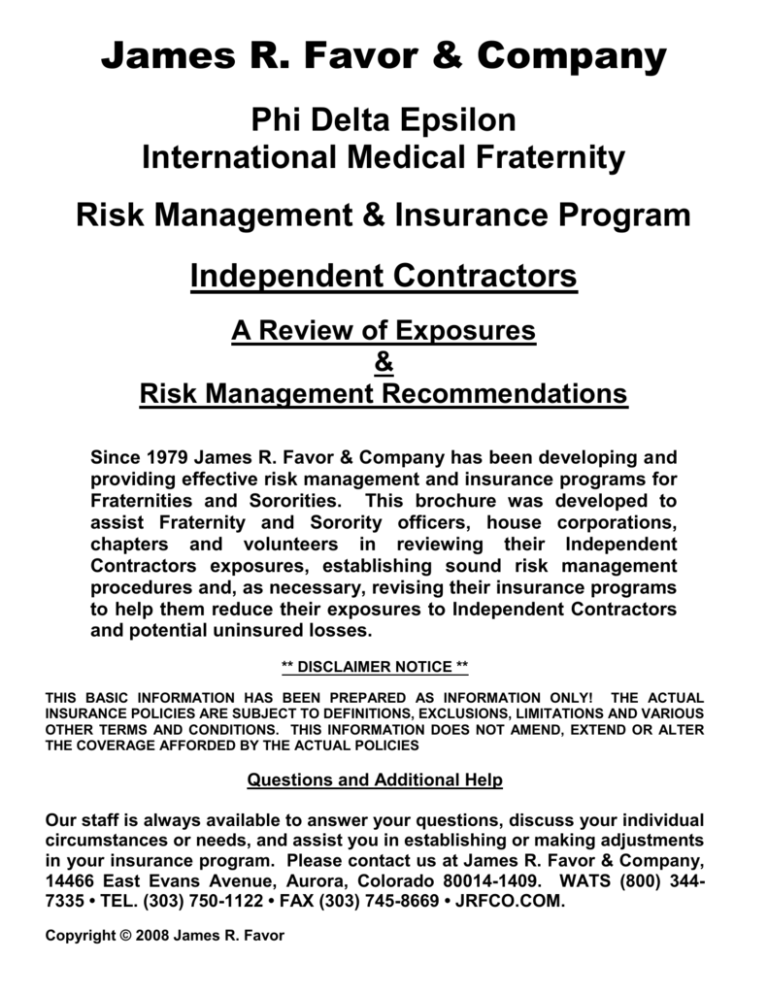Independent Contractors
advertisement

James R. Favor & Company Phi Delta Epsilon International Medical Fraternity Risk Management & Insurance Program Independent Contractors A Review of Exposures & Risk Management Recommendations Since 1979 James R. Favor & Company has been developing and providing effective risk management and insurance programs for Fraternities and Sororities. This brochure was developed to assist Fraternity and Sorority officers, house corporations, chapters and volunteers in reviewing their Independent Contractors exposures, establishing sound risk management procedures and, as necessary, revising their insurance programs to help them reduce their exposures to Independent Contractors and potential uninsured losses. ** DISCLAIMER NOTICE ** THIS BASIC INFORMATION HAS BEEN PREPARED AS INFORMATION ONLY! THE ACTUAL INSURANCE POLICIES ARE SUBJECT TO DEFINITIONS, EXCLUSIONS, LIMITATIONS AND VARIOUS OTHER TERMS AND CONDITIONS. THIS INFORMATION DOES NOT AMEND, EXTEND OR ALTER THE COVERAGE AFFORDED BY THE ACTUAL POLICIES Questions and Additional Help Our staff is always available to answer your questions, discuss your individual circumstances or needs, and assist you in establishing or making adjustments in your insurance program. Please contact us at James R. Favor & Company, 14466 East Evans Avenue, Aurora, Colorado 80014-1409. WATS (800) 3447335 • TEL. (303) 750-1122 • FAX (303) 745-8669 • JRFCO.COM. Copyright © 2008 James R. Favor James R. Favor & Company 1) Independent Contractor Basics: Are Independent Contractors what they may first appear to be or are they really employees? What exposures exist related to their status? Written Agreements are essential in defining and controlling Independent Contractor exposures. In reality, Independent Contractors create a variety of risks for Fraternities and Sororities. In at least one way, the 1986 Tax Reform Act made Independent Contractor status more attractive. It established that self-employed persons could deduct 25% of their medical insurance premiums from gross income rather than as an itemized deduction. The Independent Contractor status may be appealing to some persons for other reasons. They may have medical insurance available through a spouse. Usually, it’s getting paid without “all those deductions” that the Independent Contractor finds most appealing. 2) Management’s Interests: Management’s interest in utilizing Independent Contractors is usually, primarily driven by an employer attempting to avoid ever-increasing employee costs. The costs of insuring employees and providing competitive benefits are significant. In recent years, these costs have been driven most by increased employee benefits and the related costs of Worker’s Compensation and Medical Insurance. Employee benefit costs today are estimated to represent between 30%-40% of payroll. When every payroll dollar means up to $1.40 in total expense, the incentive to cut costs is strong. If these people are not classified as employees and that position is sustained if later challenged, a Fraternity or Sorority may be spared these costs. Under typical Independent Contractor agreements, the Fraternity or Sorority does not withhold income taxes, FICA, or unemployment taxes. The agreement should also provide that the Independent Contractor is not entitled to Worker’s Compensation or other Employee Benefits that are normally provided to employees by the Fraternity or Sorority. Copyright © 2008 James R. Favor Fraternity & Sorority Risk Management & Insurance Program 3) Identifying Hidden Risks: A Fraternity or Sorority considering the use of Independent Contractors should look at a broad range of issues. If ignored, these issues can expose the Fraternity or Sorority to potentially huge financial and legal penalties. Improperly undertaken, Independent Contractor relationships with prior or potential employees can create employer liabilities that greatly exceed potential savings. Some of the key issues to be considered by Fraternities and Sororities include: a) Enforcement agencies or the courts can look beyond the Independent Contractor agreements. A 20-Factor Test is commonly used to determine whether the substance matches the form of the relationship described in the agreement and if the contractor is truly “independent”. b) If enforcement agencies or the courts determine that an Independent Contractor is actually an employee, not only the corporation, but top management and others may be liable for back wages, payroll taxes, and/or penalties. c) Workers’ Compensation savings may well be offset by increased liability exposures. Statutory Limits under Workers’ Compensation are lost when an individual is no longer an employee. d) If injured, an Independent Contractor can sue the Fraternity or Sorority on the same basis as any other member of public. e) If the Independent Contractor proves to be an employee, the exposure exists for additional premium costs being charged to the Fraternity or Sorority for Workers’ Compensation. f) While costly, Employee Benefits do provide a powerful incentive to remain with an employer. Independent Contractors are usually considered to be less loyal than employees. g) Clearly the use of Independent Contractors must be approached with care and caution. James R. Favor & Company 4) Independent Contractor Exposures: For Fraternities and Sororities today, perhaps the most frequent Independent Contractor exposure is the use of “outside” bartenders and/or security personnel commonly required for Fraternity or Sorority sponsored events involving alcohol. Other examples include cooks, housekeepers, party planners, entertainment, catering or food services, and transportation providers. Based on past experience, we urge you to be especially cautious of Independent Contractors who provide “handyman” maintenance or repair services to your chapters and housing corporations. 5) Contractor Claim Examples: The frequent and informal use of so called Independent Contractors presents especially difficult exposures for Fraternities and Sororities. Several Fraternities and Sororities have sustained significant losses or been without expected insurance when Independent Contractors were injured or caused injuries to others. In the largest suit known to us ($10,000,000), two Independent Contractor students were hired as “cheap summer help” to repaint a chapter house. They were killed when their aluminum ladder came in contact with the electrical power lines servicing the chapter house. In another serious claim, overcrowding at a function led to the loss of three fingers by a security guard when a heavy chapter house door was slammed closed on his hand. 6) Workers’ Compensation Exposures: State Workers’ Compensation statutes impose a great and ever increasing burden on Fraternity and Sorority employers for injuries to Independent Contractors. In almost every case, the Fraternity or Sorority employer will be held responsible for Workers’ Compensation benefits unless the Independent Contractor is properly insured. The failure to maintain Workers’ Compensation coverage at every House Corporation, chapter or location exposes the Fraternity or Sorority to potentially serious uninsured losses. Copyright © 2008 James. R. Favor Fraternity & Sorority Risk Management & Insurance Program 7) Using Written Contracts Is Essential: Effective Risk Management procedures for your Independent Contractor exposures begin with written agreements. Some groups have even developed standard agreements for use with the most common exposures such as Bartenders, Security Guards, or the Rental of Facilities for functions or events. We will be pleased to assist by reviewing Risk Management considerations. Your legal counsel should draft or review all Independent Contractor Agreements. Your Independent Contractor agreements should include Hold Harmless and Indemnity Clauses in your favor. They should make the Independent Contractor responsible for any losses that may arise out of their acts or omissions. Hold Harmless and Indemnity Clauses are of greatest value only when supported by insurance or significant assets. Don’t forget to require, ask us to review, and retain the evidence of insurance materials provided by your Independent Contractors to support their agreements. Well drawn Independent Contractor agreements have been proven to be very effective in accomplishing significant risk reduction and risk transfer for Fraternities and Sororities. 8) Should You Be An Additional Insured? Being an Additional Insured under the Independent Contractors insurance establishes a limited but valuable measure of protection. Being an Additional Insured can be of particular value if your Hold Harmless or Indemnity Clauses are challenged or invalidated by the courts. In order to secure defense and coverage as an Additional Insured, it may be necessary to allow the Independent Contractor’s insurer to choose defense counsel and control your defense. Additional Insureds have other important benefits. They have direct rights under the Independent Contractor’s insurance to submit suits or claims directly to the insurer for handling. If you are an Additional Insured, the contractor’s insurer may not be able to subrogate against you if a claim payment arises out of your acts or omissions. James R. Favor & Company 9) Whose Insurance Is Primary? The Additional Insured Risk Management technique can give rise to other difficulties. When two insurance policies potentially apply to the same claim, the question of which policy is primary or first to pay usually arises. Failure to anticipate and address this important topic can result in unexpected losses. Your insurer may have to respond to a claim against you for risks that you thought had been transferred to others. Fraternity & Sorority Risk Management & Insurance Program Risk Management Recommendations for Independent Contractors To minimize your Independent Contractor exposures and reduce the potential for uninsured losses, we recommend that Fraternities and Sororities implement the following risk management actions: To avoid unexpected losses and potential problems in this area we recommend that your Hold Harmless or Indemnity Clauses, Additional Insured arrangements, and related insurance coverage address the following points. 1) As employers may be held responsible for Workers’ Compensation benefits if an injured Independent Contractor is not properly insured. Workers’ Compensation should be maintained by the National Organization and every Chapter, House Corporation, or other potential employer. a) If a claim is presented, the Independent Contractor’s insurance will be Primary. (Pay First). Your own insurance will be excess and non-contributory. (Pay claims only after the Independent Contractor’s Insurance). 2) Independent Contractors should only be used subject to the terms of a written contract that has been reviewed by both your legal counsel and insurance advisors. b) If a claim is presented, the Independent Contractor’s insurer will defend you and provide coverage on your behalf. c) If your legal advisors feel that legal conflicts exist, then the Independent Contractor’s insurance should provide that it will arrange to provide or pay for separate counsel to protect your interests. 10) Final Thoughts: Independent Contractors are a frequent source of exposure and potentially significant losses for Fraternities and Sororities. When carefully approached and planned, however, they can also be an effective method of risk reduction and transfer. The Independent Contractor topic increases the importance of employment practices as a source of potential losses for Fraternities and Sororities. Fraternities and Sororities should devote increased Risk Management attention to this area to review the various issues and exposures, analyze and address the associated risks, and monitor the ongoing effectiveness of their programs. Copyright © 2008 James R. Favor 3) Hold Harmless and Indemnification Clauses that make the Independent Contractor pay for your defense and for any losses that may arise out of their acts or omissions should be included in your contracts. 4) To further insulate yourself, require that the Independent Contractors provide you with Additional Insured status under their insurance. 5) Require that the Independent Contractor and their insurer specifically agree that their insurance will be primary while your insurance will be only excess and non-contributory. 6) Before any work is performed, require written evidence of insurance to support the indemnification agreement and verify that your insurance requirements are being met. 7) Require that the Independent Contractor’s insurance may not be cancelled or non-renewed without providing you with at least (30) thirty days prior written notice via certified mail.







